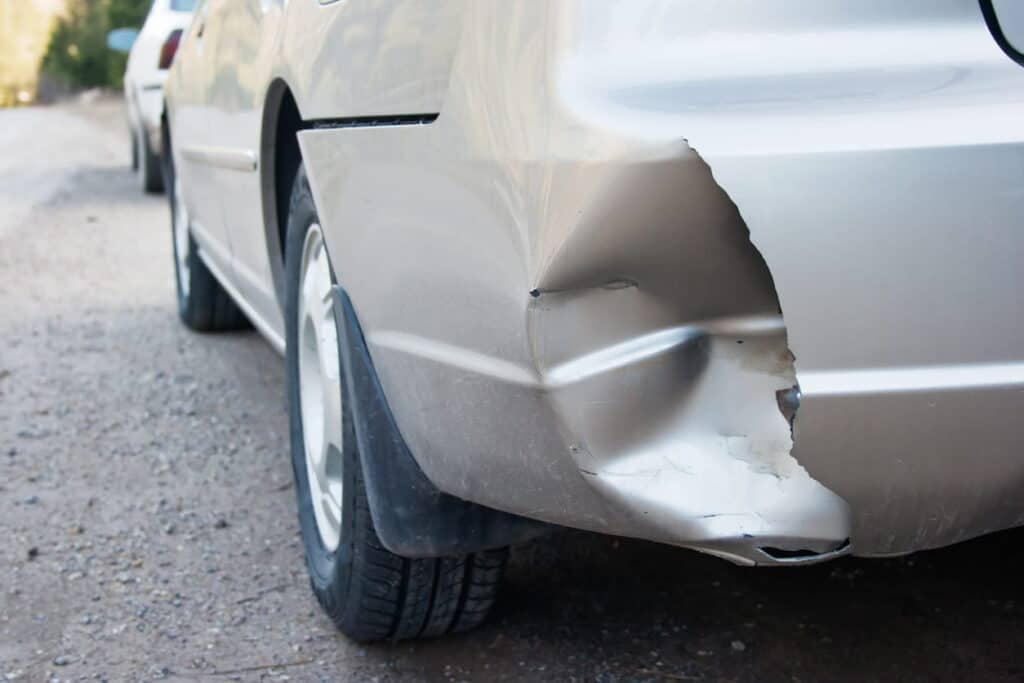Insurance Coverage for Hit and Run Accidents Explained

It can be tricky to know which car insurance coverage is best for your needs. While some policies only cover the bare minimum, others include additional coverage, like injuries or property damage caused by hit-and-run accidents. Our Tampa car accident attorneys share what you need to know about hit-and-run accident insurance.
Were you injured in a car accident? Contact Jack Bernstein, Injury Attorneys now.
What Is a Hit-And-Run Accident?
A hit-and-run accident refers to a crash in which the at-fault party drives away from the scene without providing any information or following the appropriate steps after an accident. The driver simply doesn’t stop after their vehicle crashes into another car, object, or person. This situation can be incredibly frustrating for accident victims left to deal with the damage on their own.
According to Florida Highway Safety and Motor Vehicles (FLHSMV), an average of about 103,000 hit-and-run crashes occur every year in Florida, leaving thousands of victims with serious bodily injuries.
Some motorists carry insurance that will help cover expenses after being involved in a hit-and-run crash. However, working with a Tampa hit-and-run attorney can give victims another way to get financial relief after an accident.
What Does Insurance Cover in a Hit-And-Run Accident?
What your insurance policy covers after a hit-and-run crash will depend on the type of coverage you have. Auto insurance for hit-and-run crashes may include the following:
1. Collision Coverage
The first type of insurance for hit-and-run accidents is collision coverage. In general, collision coverage will help with the costs of repairing damage to your car after being hit by another vehicle, even if that car drives away after the crash. If your car is a total loss after the accident, this type of insurance should also cover the full value of your vehicle.
In most cases, collision coverage is not a requirement unless you have a car loan that is not yet paid off or your car is leased. Many lenders require drivers to purchase this coverage.
2. Uninsured Motorist Property Damage (UMPD)
If a driver flees the scene of an accident, your insurance will generally treat them as an uninsured motorist. If you have UMPD coverage, it can help cover the cost of car repairs and other property damage caused by the crash. While Florida does not require this coverage, it can be a helpful type of hit-and-run accident insurance.
3. Uninsured Motorist Bodily Injury (UMBI)
Again, since insurance companies in most states identify hit-and-run drivers as uninsured motorists, UMBI coverage is another useful type of hit-and-run crash insurance coverage to carry. Your coverage can help with expenses linked to physical injuries you and your passengers sustain. Although Florida drivers are not required to carry UMBI coverage, you should have the option to add it to your policy.
4. Personal Injury Protection (PIP)
As a no-fault state, Florida law requires drivers to carry a minimum of $10,000 in PIP coverage and $10,000 in property damage liability (PDL). PIP insurance will cover 80% of all qualifying medical expenses, no matter who caused the accident. If you were hurt by a hit-and-run driver, PIP will help pay the cost of medical care and treatment up to $10,000.
In some cases, PIP coverage will also provide financial relief for lost wages, child care, and other expenses caused by the hit-and-run accident. However, check with your insurance provider to see if this is the case in your situation.
5. Medical Payments Coverage
Medical payments coverage — which is referred to as “med pay” — is optional insurance coverage that can help with medical bills and healthcare-related costs after a hit-and-run car accident. This type of insurance will cover qualifying expenses regardless of who caused the accident. Unlike PIP, med pay is not required by Florida law.
Immediate Steps To Take After a Hit-And-Run Accident
Now that you have a background on the role insurance plays when you’re injured in a hit-and-run car accident, it’s important to know what immediate steps to take after the accident.
Knowing what to do in the aftermath can make a significant impact on the overall outcome of your claim and your ability to recover compensation you may be entitled to.
- Ensure your safety: After the accident, call the police or 911 if you’ve suffered severe injuries to be evaluated, and start the reporting process.
- Document the scene: Document information, like a description of the vehicle that hit you, including make, model, color, and license plate number, if possible. Also, take statements and contact information from any witnesses.
- File a police report: A police report will be filed once you alert the authorities. Police reports will include details explaining the accident, but you can supplement them with photo and video evidence to support the report as well.
- Document the scene: This includes taking any photos and videos of the accident site and your vehicle. These images can be used to paint a clearer picture of the accident when negotiating with insurance companies or defending your case in front of a judge or jury.
- Contact your insurance: Alert your insurance company of the accident to begin the insurance process.
- Keep up with medical appointments: This will create a paper trail of your injuries. This paper trail for medical payments for your hit-and-run injuries will help you establish liability when you pursue a claim.
- Seek legal guidance: Contact an experienced personal injury lawyer to help provide you with guidance after your hit-and-run accident.
The Critical Role of the Police Report in Your Claim
The police report can paint a clear picture of the events that unfolded at the time of your hit-and-run accident to determine liability and negligence. This can also help locate the at-fault driver, allowing you to sue a hit-and-run driver for damages if your financial losses are not fully covered by your insurance company.
The police report serves as the official documentation of the incident, and it’s difficult for insurance companies to dispute claims made in this report — which can, in turn, minimize the compensation you can recover.
If you don’t have a police report when speaking with your insurance provider, there is a very real possibility that they could deny your claim.
Are You At-Fault in a Hit-And-Run Accident as the Victim?
In general, victims cannot be the at-fault party if the accident is considered a true hit-and-run. Insurance companies will only allow you to file a claim for damages after a hit-and-run if you did not cause the accident. If you did cause the accident and fled the scene, you have committed a crime under hit-and-run accident Florida law.
Will Your Insurance Rates Increase After a Hit-And-Run Claim?
In most cases, no-fault accidents, like hit-and-run accidents, will not cause your insurance rates to increase. This approach is widely accepted nationwide. However, this standard can vary from state to state.
If you are partially at fault for your accident, however, your insurance rates might go up, but again, this depends on your particular case, and your insurance policy as well.
How Do You Know if Your Insurance Covers Hit-And-Run Accidents?
Most accident victims will wonder, “Does insurance cover hit-and-run damage?” Damages are covered if you have hit-and-run collision insurance, or uninsured motorist hit-and-run coverage. (These are optional insurance policies that you have to add to your state required coverage.)
If you have questions about your insurance coverage for hit-and-run accidents in Florida, you should contact your insurance provider.
You may also have a copy of your policy you can review to see if you carry collision, UMPD, UMBI, or med pay coverage that can cover expenses if you’re the victim of a hit-and-run crash. If you have this coverage, you can file a UMBI hit-and-run insurance claim, or a UMPD property damage hit-and-run claim.
The Hit-And-Run Claim Process: A Step-By-Step Guide
You’re likely wondering, after a hit-and-run, how should you file a claim and move through the claims process?
You’ll find that this process is very much the same as with the typical car accident claim, but there are some things you need to be aware of.
Let’s go into a step-by-step guide of how to file a hit-and-run insurance claim after an accident.
- Start by notifying your insurance company. You’ll typically want to notify them no more than 24 hours after the accident. Waiting too long can bar you from filing a claim and seeking PIP coverage for your hit-and-run injuries.
- When you speak with the insurance company, less is always more. Never admit fault to the insurance representative, and keep the conversation to a minimum.
- After you’ve contacted your insurance provider, submit documentation of the hit-and-run accident, like the police report, photos of the accident, and repair estimates. This documentation will be used by your insurance provider to calculate a settlement amount.
- The insurance investigation process will begin after you file your claim. Their investigation might include reaching out to you to ask for further details about the accident, following up with the police report, and contacting witnesses who might have observed the accident.
- When speaking with the insurance provider, keep your answers straightforward and clear. One of the benefits of working with a hit-and-run personal injury attorney is that the attorney will speak on your behalf, and will know how to navigate the claims process when dealing with the insurance company to maximize your claim amount.
What Happens if the Hit-And-Run Driver Is Identified?
If the at-fault driver who fled the scene is found, several things will happen. They will likely be charged with leaving the scene of an accident. Your insurance company will also take their own action in an effort to recover financial losses they’ve had to cover because the driver fled the scene through a process called subrogation.
Schedule a free consultation with a Tampa hit-and-run attorney

If you were injured in a crash, a hit-and-run accident Tampa lawyer can help you get the compensation you deserve. Contact our experienced hit-and-run crash Tampa attorneys to schedule a free consultation, and see what your case may be worth.
Were you injured in a car accident? Contact Jack Bernstein, Injury Attorneys now.
Sources:
Florida Insurance Requirements.
About the Attorney

Jack G. Bernstein, ESQ.
Jack G. Bernstein is a veteran Florida personal injury attorney with over 40 years of experience practicing since 1983, successfully litigating 50,000+ cases spanning car accidents, truck accidents, slip-and-fall accidents, wrongful death and complex personal injury claims. A proud University of Miami School of Law graduate, he holds active membership in the Florida Bar Association and Clearwater Bar Association. Jack delivers relentless, client-first advocacy to maximize compensation and justice in every case.
